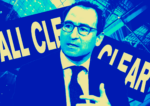Trending
Paydirt: The frightened herd of domestic banks has created a very strange condo market
The industry news you need to start your week, and what’s ahead

Silly sheep: Overcompensation is a dangerous thing – in driving, dating and the lending business.
It’d be one thing if U.S. banks were merely done with the likes of ultra-pricey projects dotting Billionaires’ Row. In 2013 and 2014, developers fell over themselves trying to cater to the captains of the universe, and banks were only too happy to enable them. But demand for that kind of product will always be limited, and one-off marquee transactions, such as Ken Griffin’s reported $200-million plus deal at 220 CPS or Bill Ackman’s $91.5 million buy at One57, don’t do much for lenders. Best case, they get paid back, worst case, they’re stuck with a half-sold castle in the sky they have no idea what to do with. Globally, the growth of ultra high-net-worth buyers, the types that can buy this stuff, is slowing, Knight Frank research shows. And after seeing unit after unit languish on the market and take multiple markdowns, it’s not hard to figure why banks want to pull back.
But letting that skittishness spill over into lending on more earthbound projects seems more a consequence of herd mentality and fear than anything else. Demand for sensibly-priced product in New York is not a fleeting trend.
The city’s population is projected to hit 9 million in 2040, up 9.5 percent from 2010, the Department of City Planning projects. And in the Manhattan condo market, there is no longer as wide a gulf between asking prices on new product and sales prices in the following year. In 2015, for example, the average asking price for approved condo units was $5.1 million, while the average condo sales price in 2016 was just $3.1 million. In 2016, however, the average asking price for approved condo units was just under $3.8 million, while the average condo sales price in 2017 is projected to be $2.9 million.
This is certainly an imperfect analysis, because not all new product approved will sell and close within a year. But at the very least, it shows that product coming online now is priced more in line with actual trades.
Demand for appropriately-priced product, even on the high end, remains healthy today, many observers said. In the luxury market so far in 2017, deals above $5 million are up 30 percent year-over-year, according to Corcoran Sunshine’s Kelly Kennedy Mack.
Yet banks sit on the sidelines. Developers are struggling to get construction loans even when their projects make sense. The domestic banks who do act, such as Bank of the Ozarks, are seen as mavericks. “A lot of our competitors tend to move as a pack and are heavily driven by headline risk,” the bank’s CEO George Gleason told the Wall Street Journal in July.
As a consequence, alternative lenders, such as private equity shops and hedge funds, have cornered the condo development market. But their investors look for big returns, so what they tend to bankroll are high-risk, high-reward ultra-luxe condos – the very type of product that we’re now watching struggle.
“The optics of the new development market are based on the first wave of product,” Miller Samuel’s Jonathan Miller, who tracks the luxury market like one might a favorite sports team, told me. “In this cycle, the top layer was on stilts.”
What isn’t okay anymore is asking $50 million for a condo when it’s worth less than half that. But banks could benefit from making a distinction between absurdly-priced product and a sector that still has lots of room to run. Don’t hate the game, hate the starry-eyed players.
Less pitching, more selling: All this creates an interesting environment for the city’s new development marketing firms, who’ve been feasting for the past two years, breaking record after record. Now, though they are plenty busy with existing inventory, they’ve got less brand-new business to look forward to.
Corcoran Sunshine, for example, picked up just $3.2 billion in approved exclusives in 2016, a year-over-drop of nearly 68 percent from $10 billion, a new analysis by TRD found. Elliman had a nearly-identical drop in new business, picking up just $2 billion in exclusives compared to $6 billion. Compass, Halstead, Town all took a hit.
This shift will likely lead to some internal restructuring (and potentially layoffs) at the firms, with less time spent pitching and more selling. Brand-name brokers who catapulted to the top on the strengths of their new-development assignments will probably wade deeper into the resale market, and brokers will have to get even better at the art of persuading developers with overpriced product to adjust pricing and offer more concessions, as Toll Brothers and others are doing.
“Everyone feels a little more pressured,” Elliman’s Susan De Franca told my colleague Miriam Hall. “But that’s what separates the men from the boys.”

From left: Joseph Chetrit, a rendering of 9 Dekalb Avenue and Michael Stern
Brooklyn’s tallest tower scores $135M loan: Michael Stern and Joseph Chetrit seem poised to move ahead on Brooklyn’s first 1,000-foot-tall skyscraper. The partners secured $135 million in funds from Bank of the Ozarks (remember them?) and Melody Finance, replacing a previous loan from Kushner Companies and Fortress Investment Group. The project, slated to rise 73 stories and include over 400 rental apartments, is still on the hunt for a $265 million-plus construction loan. Stern is on a hot streak at the moment, having landed $660 million in financing for his “dancing” copper towers on the East River in December.
Treasury extends leaky disclosure regs: The Treasury Department extended an initiative designed to unmask hidden buyers of luxury real estate. Its so-called geographic targeting order requires title companies to disclose the true owner of shell companies making all-cash purchases of real estate in New York, Florida, California and Texas. It’ll now run through Aug. 22, and Treasury officials said they’ve been pleased with the results so far: nearly a third of the transactions covered by the order over the past year, they said, have involved someone linked to suspicious financial activity.
The program has been slammed for its numerous loopholes, the most egregious one being the fact that it doesn’t cover wire transfers, attorneys said. And there’s no indication that the Treasury Dept. has addressed those loopholes this time around.
“If you’re looking to hide money, you’ll find a way to do it,” Herrick Feinstein’s Jonathan Adelsberg said when the initiative was announced last year. “The irony is, if you’re engaging in money laundering, and things are really un-kosher, you don’t care about the provision of a contract.”
(Paydirt is a weekly column that riffs on the biggest NYC real estate news of the moment, providing analysis and historical context on the deals and players that make this town tick. Read more from Paydirt here.)




